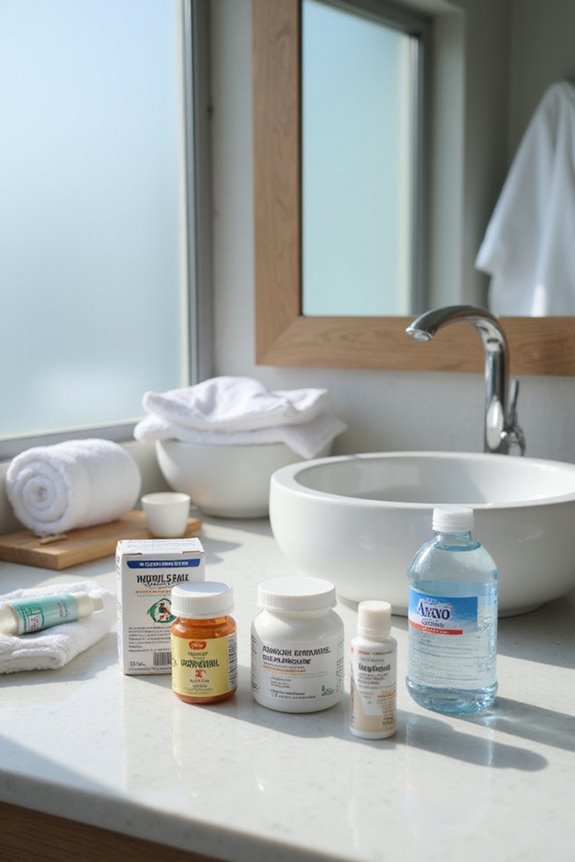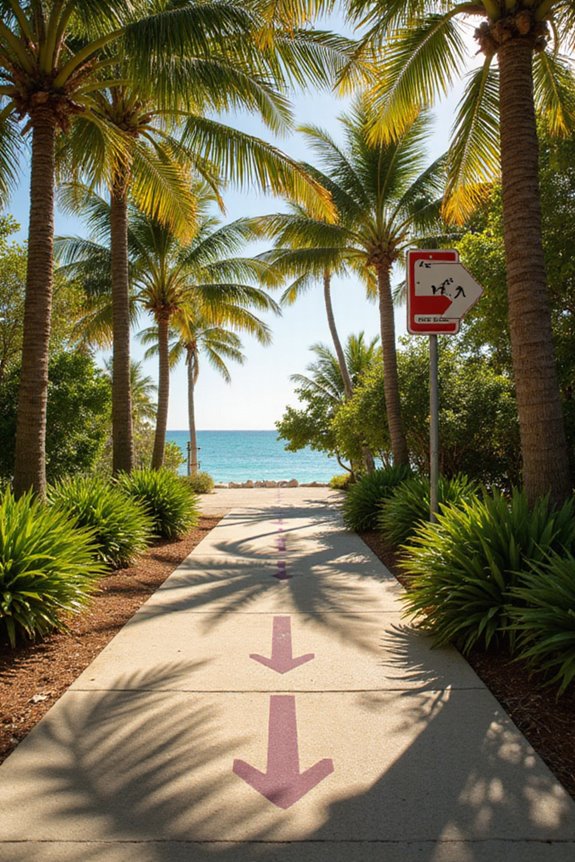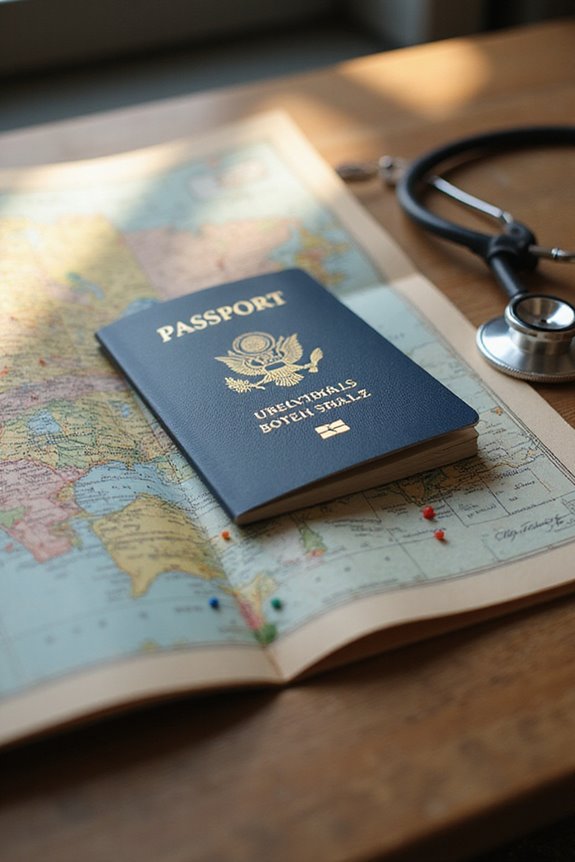If you find yourself battling food poisoning while traveling, it’s best to stay calm. Start with sips of clear liquids to settle that rumbling stomach, and keep some bland snacks around—saltines work wonders. If your symptoms get nasty, like bloody diarrhea or a high fever, don’t hesitate; call for help! Also, be smart about what you eat—go for steaming hot meals and avoid anything sketchy. Stay tuned; I’ve got more tips up my sleeve!
Key Takeaways
- Stay hydrated by sipping clear liquids and consider oral rehydration solutions to replenish lost fluids and electrolytes.
- Keep bland snacks like saltine crackers to help settle your stomach.
- Monitor symptoms closely; seek medical attention for bloody diarrhea or high fever.
- Practice good hygiene by washing hands frequently and choosing reputable dining establishments.
- Be aware of the severity of symptoms; high-risk groups should seek prompt medical care for any concerning signs.
Understanding Food Poisoning and Its Symptoms
Food poisoning can feel like a sudden, unwelcome guest crashing your vacation party, right? One minute you’re enjoying street food, and the next, you’re fighting nausea, cramps, and maybe even fever. It’s wild how symptom severity can vary—some folks just get a mild case, while others face severe symptoms like bloody diarrhea or high fever. Trust me, when your immune response kicks in, it’s no joke! I once had to deal with frequent vomiting that kept me glued to the bathroom floor—talk about a vacation nightmare! If you notice signs of dehydration, like a dry mouth or dizziness, don’t wait; get help! Recognizing these symptoms early can save you from a prolonged battle with food poisoning.
Common Causes of Traveler’s Diarrhea
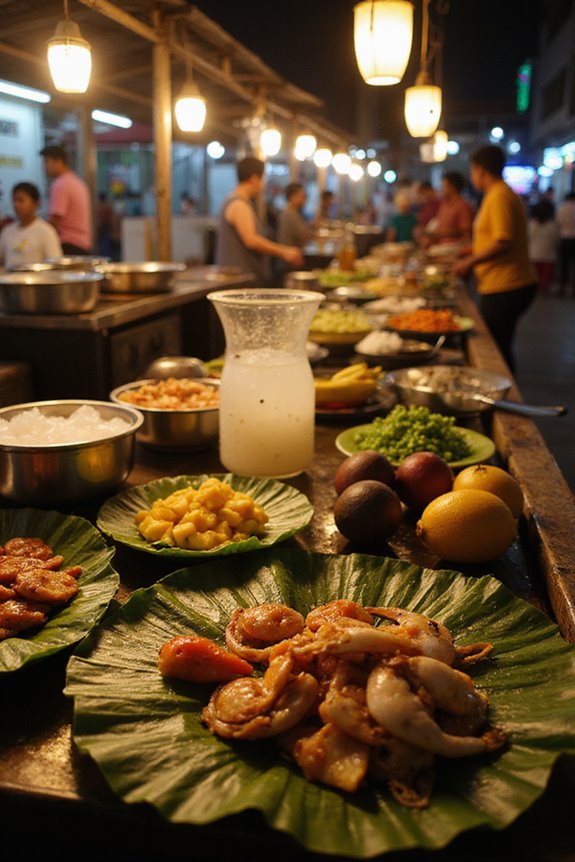
When you’re on the go, enjoying new cuisines and trying street food, the last thing you want is a bout of traveler’s diarrhea crashing the party. I’ve had my fair share of close calls, and it usually stems from bacterial infections like enterotoxigenic *E. coli*, which is the most common culprit. You might also encounter viral infections from nasty little things like norovirus. Then there are parasitic infections, which are less common but can stick around longer than you’d like. These germs often hitch a ride through contaminated food or water, slipping in through transmission pathways like dirty hands or poorly cooked meals. So, keep your guard up—your stomach will thank you later!
Prevention Strategies to Avoid Food Poisoning
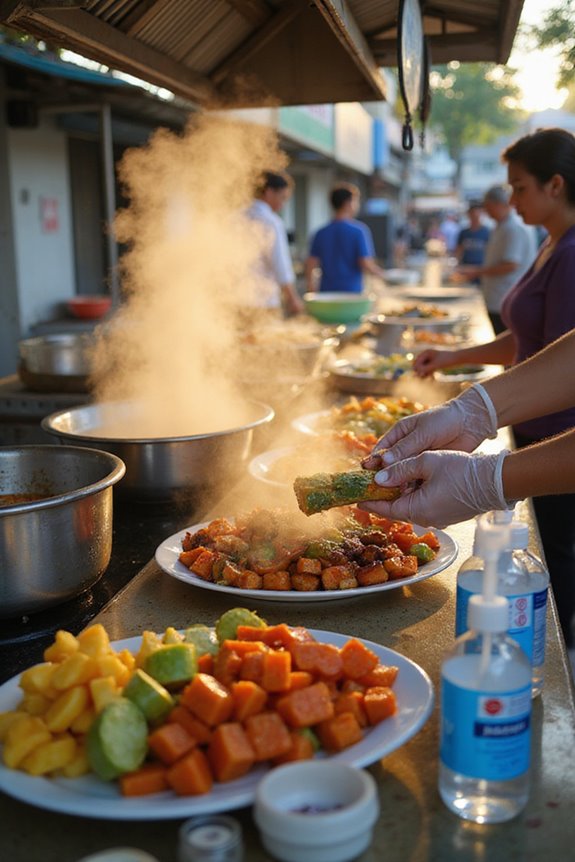
Traveling can be a delicious adventure, but it can quickly turn sour if you’re not careful about what you eat. I always make sure to practice good hygiene; washing my hands before meals is non-negotiable. If there’s no soap and water, I’ve got my trusty hand sanitizer on hand, usually with at least 60% alcohol. When it comes to food selection, I’m picky! I stick to hot, steaming dishes or well-chilled salads, avoiding anything raw or undercooked. And don’t get me started on street food—yikes! I prefer dining in places where I can see the staff following solid hygiene practices. Staying safe while eating means I can enjoy my travels without the dreaded food poisoning ruining my fun!
High-Risk Travel Locations for Food Safety
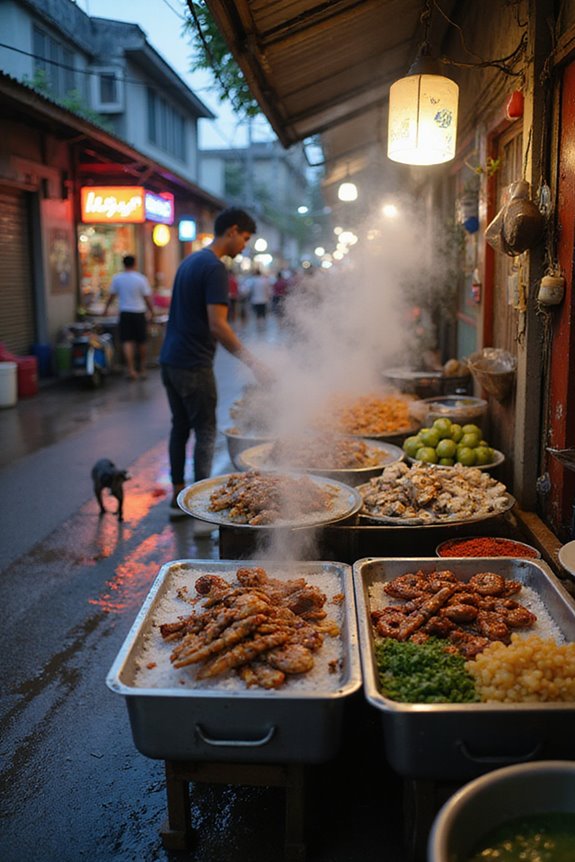
While it might be tempting to indulge in all the culinary delights a destination has to offer, some places can really test your stomach’s resilience. I’ve traveled through high-risk regions like parts of Asia, Africa, and South America, and let me tell you—the foodborne hazards are real! In these areas, street vendor foods can be a gamble, and salads can harbor all sorts of trouble if they’re not washed properly. I remember biting into a seemingly innocent fruit in Mexico, only to regret it later! The lack of clean water and proper sanitation can make even the most mouthwatering dishes a potential threat. So, if you find yourself in these regions, I recommend sticking to sealed snacks and cooked meals to keep your tummy happy!
Medications and Prophylaxis for Traveler’s Diarrhea
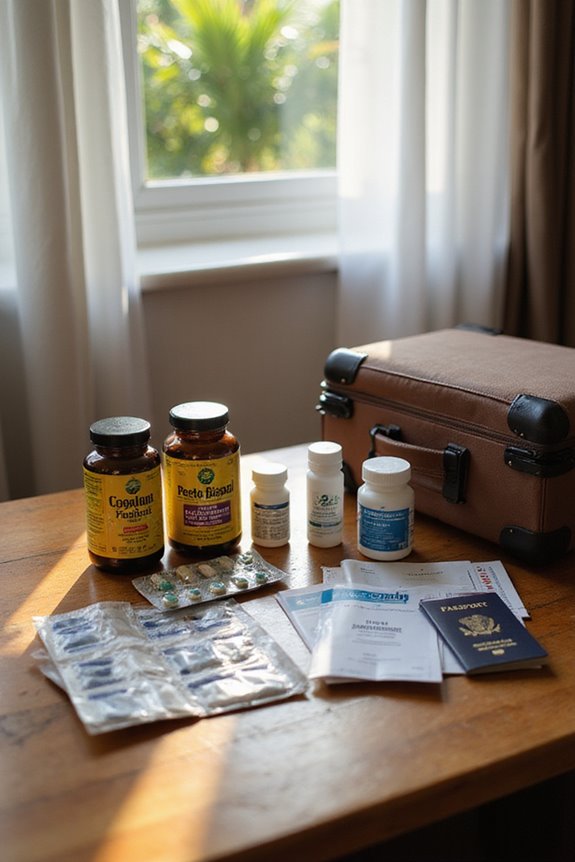
If you’ve ever found yourself dodging the dreaded traveler’s diarrhea, you know how essential it is to have the right medications and strategies on hand. Trust me, I’ve been there! For symptom management, bismuth subsalicylate (think Pepto-Bismol) can help reduce stool frequency, and loperamide (Imodium) is a go-to for slowing things down—just avoid it if you’ve got fever or blood in your stool. Now, if things get really nasty, antibiotic options like azithromycin or fluoroquinolones can save the day, especially for severe cases. I tend to reserve antibiotics for when symptoms linger more than a couple of days. Prophylaxis? Bismuth subsalicylate can offer about 65% protection, but remember, it’s not a magic bullet. Stay prepared!
Immediate Actions for Food Poisoning Symptoms
Food poisoning can hit you like a freight train, and when it does, knowing what to do right away is essential. First off, I’ve learned to jump on rehydration techniques immediately. Sipping clear liquids slowly helps settle my stomach—no one wants to vomit again! Oral rehydration solutions are a lifesaver, restoring that lost fluid and electrolytes. I also keep bland snacks like saltine crackers on hand. While managing symptoms, I track how often I’m running to the bathroom or if that fever is creeping up. If things get serious, like bloody stools or high fever, I don’t hesitate to call for medical help. Remember, taking these steps can make a world of difference in your recovery!
Safe Food and Drink Practices During Travel
When I think about traveling and enjoying delicious local cuisine, I can’t help but feel that tingle of excitement—but also a slight twinge of caution. To make the most of my adventures, I focus on safe food selection. I always opt for freshly cooked dishes served piping hot—those lukewarm meals? No thanks! I steer clear of raw meats, undercooked seafood, and even fresh salads that might’ve been rinsed in unsafe water. And let’s not forget beverage safety; I only drink bottled water with a sealed cap or hot beverages. If ice is involved, I make sure it’s from purified water. Being smart about my food choices means I can enjoy the flavors of my travels without the downside of foodborne illness!
When to Seek Medical Attention
Sometimes, it’s hard to know when to take food poisoning seriously, especially when you’re in a foreign place, trying to savor every moment. If you’re monitoring your symptoms, keep an eye out for warning signs. Bloody diarrhea? That’s a major red flag. Diarrhea lasting more than three days? Get help before dehydration kicks in. A fever over 102°F? You need medical resources pronto! If you can’t keep fluids down or notice dizziness, don’t hesitate to seek care. Pregnant, elderly, or battling chronic illnesses? You’re in a higher risk group and should act quickly. Trust me, early intervention can save you from a nasty ordeal. Stay safe, stay aware, and don’t let food poisoning ruin your adventure!
Frequently Asked Questions
How Long Does Food Poisoning Typically Last While Traveling?
When I experience food poisoning, symptom duration can vary. Recovery tips like staying hydrated and seeking medical help if symptoms persist beyond a week really help. It’s essential to listen to my body during this time.
Can I Travel if I Have Food Poisoning Symptoms?
I wouldn’t recommend traveling with food poisoning symptoms. Proper symptom management is essential, and travel precautions are necessary. It’s better to rest and recover fully before resuming any plans to avoid worsening your condition.
Are There Specific Foods to Avoid in Certain Countries?
I remember savoring street food’s allure, but I’ve learned to avoid certain local delicacies. Raw seafood and undercooked meats can spell trouble, especially in high-risk areas. Prioritizing safety helps me enjoy travel without regrets.
What Should I Pack for Food Safety While Traveling?
When I pack for food safety, I prioritize airtight food storage and include hand sanitizer. I always follow good hygiene practices, ensuring my meals stay fresh and minimizing the risk of contamination while traveling.
Can Probiotics Help Prevent Travel-Related Digestive Issues?
Did you know 30-70% of travelers experience digestive issues? I’ve found that certain probiotic types can really boost gut health, helping me stay balanced and reducing the risk of those uncomfortable travel-related problems.

